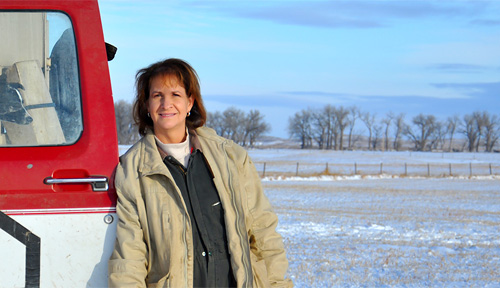An advertisement the size of a business card forever changed Murlene Nollmeyer Osburn’s life and, as a result, the lives of people in north central Nebraska.
At 52, Osburn is a wife, mother of nine, grandmother, nursing director, pilot and owner/operator of a Nebraska cattle ranch.
Now, the UNMC graduate has added family psychiatric nurse practitioner — a career she only dreamed about a few years ago. Osburn’s 3,760-acre cattle ranch is near Wood Lake — a small town between Valentine and Ainsworth. The area she refers to as the “boonies” is far from a college or university where students learn to diagnose, treat and prescribe medications. Distance is measured in commute time — 30 minutes to her children’s school, 2 1/2 hours to Walmart.
One day, an ad in the Hooker County newspaper caught her eye: ‘Train to be a Psychiatric Nurse Practitioner and Stay Home.”
The application deadline for UNMC’s new Primary Integrated Psychiatric Nurse project was in two days. The project, funded by a $1.18 federal grant, seeks to increase the number of psychiatric nurse practitioners in rural Nebraska through an Internet-based learning and videoconferencing system.
In Nebraska, 88 of 93 counties are designated mental health shortage areas. About 70 percent of the mental health professionals who can prescribe medications live in the Omaha/Lincoln areas. There is no mental health professional within at least a 150-mile radius of Osburn’s home.
“It was unbelievable,” Osburn said, “but I called.”
An hour later, she had submitted her resume. Soon after, she interviewed in Omaha with Michael Rice, Ph.D., professor and director of the PIPN project.
“So many young people applied,” she said. “I was 50-years-old and thought there was no way I would get in.”
But she did and was required to leave her home only to see patients in clinics.
“I joined class through my computer,” Osburn said. “I talked to my teachers and classmates while sitting in my house. Once, I had just come from milking the cows and had manure on my boots. It didn’t matter.
“I could never have done it any other way.”
Since there are no psychiatrists or psychiatric nurse practitioners in her area, she drove four hours to Hastings and Kearney where a preceptor supervised her required 540 clinical hours.
She’d leave home at 3:30 a.m. on Monday and return by 9:30 p.m. on Wednesday after putting in 30 hours of clinical work in three days — and living in a Hastings motel.
Family and neighbors stepped in to care for her cows, put up hay and repair fences, windmills and buildings.
“We don’t have anyone to provide mental health services and the need is so great,” she
said. “I have no intention to go to the big city. My calling is in rural Nebraska.”
Osburn remembers when she needed mental health services but didn’t get them. At the time, she lived on a Montana sugar beet farm with her first husband and family and worked as a nursing supervisor in a geriatric psychiatry facility. After her son, Ben, was killed in a 1997 farming accident she sank into a deep depression.
“For a while, I thought there was no hope. Things were really dark. If I could have gotten the help I needed, my life would have been different,” she said. “Now, I want to make sure others have access to mental health treatment.”
Her marriage ended. She re-married, though she admits too quickly, and in 2004, she and her second husband bought a ranch in Nebraska. After a few years and two children, the relationship ended in divorce — while she was pursuing the PIPN program at UNMC.
“When I was left on the ranch, I had two young children to raise and the responsibilities of the ranch,” Osburn said. “I was overwhelmed.”
She wanted to give up.
But, in May 2011, neighbor Danny Osburn said: “Failure is not an option; we will not let you fail.”
Just when she thought everything was under control, her son, Brian, still in Montana, was diagnosed with brain cancer. He had surgery that fall, two days after he turned 23. She took time off of school and delayed her graduation. He was successfully treated and returned to work.
Back on the ranch and back in school, she and Danny became closer and married this past December, just days before graduating with a master’s degree from UNMC’s College of Nursing.
She doesn’t know what job she’ll take after certification, but she’s already being heavily recruited by two hospitals. Jobs are plentiful for this specialty, which gets an average annual salary of up to $90,000.
“I have the opportunity to be involved in the two fields I love — agriculture and nursing. The possibilities are unlimited.”
